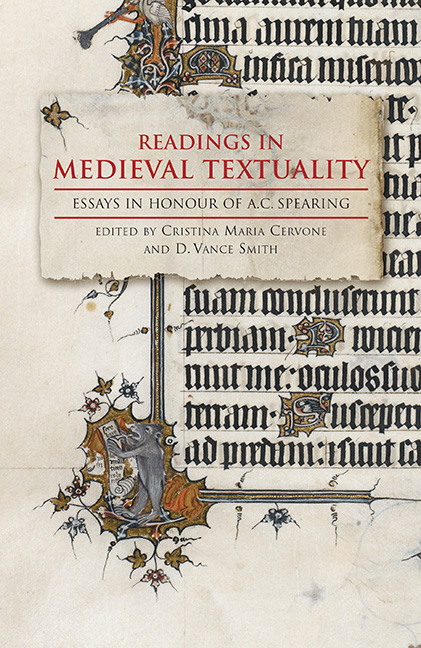Book contents
- Frontmatter
- Contents
- List of Illustrations
- List of Contributors
- A. C. Spearing's Work and Influence
- Bibliography of A. C. Spearing's Works
- I Reading Experience and Experientiality
- II Revisions and Re-visioning of Alliterative Poetry
- III Subjectivity and the Self
- 6 Re-reading Troilus in Response to Tony Spearing
- 7 The English Charles: Subjectivity, Texts and Culture
- IV Reading for Form
- V Epilogue
- Works Cited
- Index
- Tabula Gratulatoria
6 - Re-reading Troilus in Response to Tony Spearing
from III - Subjectivity and the Self
Published online by Cambridge University Press: 25 October 2017
- Frontmatter
- Contents
- List of Illustrations
- List of Contributors
- A. C. Spearing's Work and Influence
- Bibliography of A. C. Spearing's Works
- I Reading Experience and Experientiality
- II Revisions and Re-visioning of Alliterative Poetry
- III Subjectivity and the Self
- 6 Re-reading Troilus in Response to Tony Spearing
- 7 The English Charles: Subjectivity, Texts and Culture
- IV Reading for Form
- V Epilogue
- Works Cited
- Index
- Tabula Gratulatoria
Summary
In 1988 I published the most psychoanalytic essay I have written on a medieval text, “Masculine Identity in the Courtly Community: The Self Loving in Troilus and Criseyde,” chapter three in Community, Gender and Individual Identity: English Writing 1360–1430. Soon after its publication I received a longish letter from the brilliant medievalist who had tried to teach me when I was an undergraduate at Cambridge and he my director of studies. Very patiently he taught a student who had only been accepted at Cambridge to play cricket, a student who had no clue as to who was Jonson and who was Johnson, nor any idea of what he was expected to do with Chaucer's Troilus and Criseyde. In the letter I mention (1989) there is a substantial criticism of the psychoanalyzing chapter on Troilus. In my contribution to this volume in honor of A. C. Spearing I would like to quote from this letter. I do so because it offers a glimpse of his critical and pedagogic ways, a small, informal window to Tony's modes of instruction and attention. Here too, I think, one can discern its ethical dimensions, sometimes rather hidden in the author's ironic voice. Having discussed some of the letter I will try to take up one of its suggestions, however belatedly.
First, however, I offer an indication of the reading of Troilus to which Tony was responding. Despite expressing some doubts about the deployment of psychoanalytic theory in the interpretation of a medieval poem these doubts were not explored, but were set aside in the general claim that such theory helps one focus on aspects of the poem otherwise easily overlooked (139). As with so many examples of this familiar move, there is an unexamined assumption that the contemporary theory favored by the modern reader has resources to illuminate, even explain, aspects of the medieval text which the latter lacks. In this particular essay, the author's neo-Marxist paradigms of inquiry were fused with psychoanalytic work by Melanie Klein, together with materials from Dorothy Dinnerstein, Freud, Kristeva, Irigaray, and Winnicott. The putative justification for this glossatorial apparatus was the way Troilus and Criseyde displays distinctively masculine forms of anxiety from the opening of Book 1 together with forms of infantilization only found in the male lover.
- Type
- Chapter
- Information
- Readings in Medieval TextualityEssays in Honour of A.C. Spearing, pp. 85 - 96Publisher: Boydell & BrewerPrint publication year: 2016



